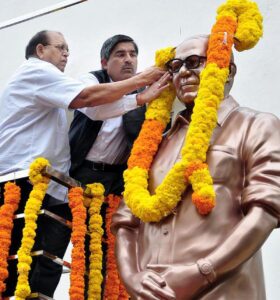Serukalathur Ramanathan Sankaran, widely known as SR Sankaran, was a distinguished Indian Civil servant who was known for his unwavering bravery and commitment to social Justice, fighting for the marginalised community.
His life has earned him the title of “People’s IAS”. He was laid to rest on October 7, 2010, in Hyderabad, Andhra Pradesh, at the age of 75.
Early Life and Education:
SR Sankaran was born on 22 October 1934 in Thanjavur, Tamil Nadu, in a Tamil Brahmin Family. He pursued a degree in Commerce at the American College in Madurai, where he graduated with honors, securing the top position in his class. Later on, he joined the same institution as a Lecturer in Commerce. He was the first to be appointed to the college’s Commerce Department with an honors degree.
However, in 1956, leaving behind his academic career, Sankaran joined the Indian Administrative Service, being allocated to the Andhra Pradesh cadre. He was a socially driven force who desired to make a difference for the marginalized community.

SR Sankaran IAS Biography Overview Table:
The following is an overview biography of SR Sankaran in a table format:
| Birth Place | 22 Ocboter 1934 Thanjavur, Tamil Nadu |
| Died | 7 October 2010 |
| Resting Place | Panjagutta Crematorium, Hyderabad |
| Occupation | Civil Servant |
| Year Active | 1956-2010 |
| Known For | Indian Administrative Services, 1976, Abolition of Bonded Labour Act |
| Award | Padma Bhushan |
| Associated with | Safai Karmachari Andolan- NGO |
Civil Servant Career:
Throughout his illustrious career, SR Sankaran held several key positions:
- Sub-Collector of Nandyal in the Kurnool district (1959).
- District Collector of Adilabad, Khammam, and Nellore.
- Special Assistant to Mohan Kumaramangalam, the then Minister for Steel and Mines, where he played a pivotal role in the nationalization of coal mines between 1971 and 1973.
- Principal Secretary for Social Welfare in Andhra Pradesh, during which he established Integrated Tribal Development Agencies and introduced Special Component Plans and Tribal Sub-Plans to ensure budgetary support for weaker sections of society.
- The Chief Secretary of Tripura, serving for six years under Chief Minister Nripen Chakraborty.
Nationalization of coal mines:
During his time at the Ministry of Steel and Mines, one of his most significant contributions was leading the charge in the nationalization of coal mines between 1971 and 1973. This paved the way for scientific practices in the coal mining industry and brought a change in the condition of the coal miners. It was one of those rare moments where policy and compassion went hand-in-hand, thanks to his conviction.
Sankaran’s contribution to the marginalized community:
He returned to Andhra Pradesh as Principal Secretary for Social Welfare with the Government of Andhra Pradesh, a position he held for 2 years. In his first tenure as Principal Secretary, Sankaran took meaningful steps to uplift marginalized communities. He set up Integrated Tribal Development Agencies to make administration in tribal areas more focused and effective. He also introduced the Special Component Plan and Tribal Sub Plans, making sure that a fair share of the budget was set aside specifically to support the most financially vulnerable sections of society.
Under these schemes, SR Sankaran raised issues such as religious conversions, atrocities against women, and education for dalits. In 1984, he set up dedicated schools and hostels for dalit people, which eventually developed into the Andhra Pradesh Social Welfare Residential Schools and later came to be known as Telangana Social Welfare Residential Schools.
Abolition of Bonded Labour Act,1976:
One of the landmarks in SR Sankaran’s career was his contribution to the Abolition of Bonded Labour Act, 1796. He toured from village to village, inspiring the people to break free from the inhuman hold of bondage and contribute to the Abolition of Bonded Labour Act, 1976.
Throughout these decades, Sankaran’s unwavering dedication to social justice significantly contributed to the effective implementation of anti-bonded labor legislation and the upliftment of marginalized communities in Andhra Pradesh.
Dangers of the Abduction:
On December 27, 1987, A group of 25 government officials was returning in a convoy of five vehicles after participating in a review program in the forest area when the convoy was intercepted by People’s War Group (PWG) members. The Naxalites kidnapped seven Indian Administrative Service (IAS) officers, including Sankaran, and demanded the release of their imprisoned comrades in exchange for the hostages.
The Andhra Pradesh government, led by Chief Minister N. T. Rama Rao, ultimately conceded to the PWG’s demands, releasing several Naxalite leaders from prison to secure the safe return of the abducted officials. Sankaran and his colleagues were released unharmed after 12 days in captivity. The incident gained both national and international attention due to the reputation of S.R. Sankaran.
Post-Retirement Life and Mentorship in Safai Karmachari Andolan:
After his retirement in 1992, as the chairperson of the Safai Karmachari Andolan (SKA), SR Sankaran used his position to fight against manual scavenging. He wrote to district collectors, urging them to enforce the Manual Scavenging Eradication Act. Sankaran strongly believed that no one should be forced into such degrading work and envisioned an India free from manual scavenging. He remained dedicated to this cause throughout his life.
Personal Values and Lifestyle of SR Sankaran
SR Sankaran chose to remain unmarried and led a simple life. He donated much of his salary to organizations supporting marginalized communities. In 2005, he declined the Padma Bhushan award, stating he was merely fulfilling his duty.
Legacy and Impact
SR Sankaran passed away on October 7, 2010, in Hyderabad at the age of 75. In 2011, the Andhra Pradesh government honored him by installing a statue in front of the Department of Social Welfare office, making him the first civil servant to receive such recognition. His legacy endures through annual lectures, scholarships, and social programs established in his name.

Conclusion
SR Sankaran’s life exemplified ethical governance, empathy, and strong personal convictions. He demonstrated that the Indian Administrative Service is not just a career but a platform for meaningful change. For UPSC aspirants and civil servants, his story serves as a reminder that real change begins with purpose, not power.
If you like this article, make sure to read our recent article on “How to Start UPSC Preparation from Scratch in 2025”




